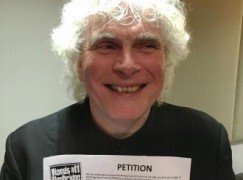Simon Rattle joins angry letter to the Guardian
mainThe letter that the Guardian has been reluctant to publish – a rebuttal by musicians of a stupid article on ‘elitist’ teaching of children to read music – has gained some extra names and newsworthiness.
We hear that around 400 musicians have now signed, including Sir Simon Rattle, Sir James MacMillan, Colin Matthews and Sarah Connolly.
No word yet from the Guardian about publication. They are not coming out of this well.

Read the full letter here.





Comments